Nike Supplier
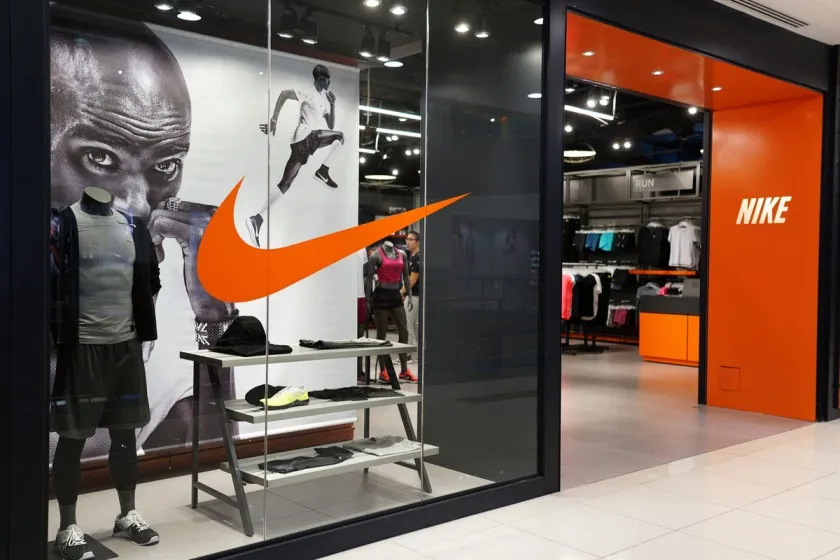
Nike Supplier
Nike maintains an expansive supply chain to produce all its footwear and apparel products, contracting out manufacturing to various independent suppliers.
Nike requires its suppliers to meet stringent quality standards for materials supplied, while simultaneously striving to source materials locally in order to reduce environmental impacts.
Asia
Nike uses several factories across Asia for producing sneakers and apparel, with Phnom Penh being just one. Their 108-page corporate responsibility report lists these factories, some of which may have abusive practices such as forced overtime and restricted access to drinking water; activists have long called upon corporations to disclose where their products are manufactured so independent observers can monitor working conditions more easily.
Nike has taken steps to enhance working conditions at its factories. It has joined the Fair Labor Association, an alliance between shoe and clothing companies as well as nongovernmental organizations (NGOs) that audit factories to encourage higher standards. Furthermore, it has adopted manufacturing techniques which reduce waste production while using eco-friendly materials; using its marketing power to spread environmental awareness by sponsoring sports teams and celebrities.
Nike recently issued a statement emphasizing their dedication to creating safe and healthy workplaces at all of their global plants, by replacing harmful chemicals with safer options, installing local exhaust ventilation systems and employing cutting-edge water-efficiency technologies for clothing material dyeing/finishing/fabrication processes and footwear production.
As part of its effort to reduce environmental impacts, Nike is actively advocating products crafted with recycled cotton or organic cotton and other sustainable materials. In the US alone, they have launched a line of running shoes made out of recycled plastic bottles and car tire sidewall rubber to promote sustainability; additionally, there is a program in place to replace petroleum-based solvents with water-based solvents.
Phil Knight holds a strong connection to Oregon, particularly Portland where his shoe business began. He remains active in his community and regularly donates to various nonprofits such as Oregon Museum of Art. Additionally, Phil is one of the founding members of Nike Foundation which funds education and research into health and fitness for which they have awarded over $7 Million grants to universities, schools and community projects across Oregon.
Europe
Since 1994, Nike has built distribution centers in Laakdal in Belgium since 1994. Together with Meerhout and Ham sites, their European Logistics Campus (ELC) represents one of the largest networks for sports shoes and apparel throughout Europe – winning Flanders Investment & Trade’s Foreign Investment of the Year award in 2016.
Nike is an international business with offices all around the world, with headquarters located in Beaverton, Oregon in the United States and employing over 70,000 people globally. Nike takes great care to uphold sustainability and environmental responsibility through its manufacturing practices which aim to minimize energy usage, water consumption, carbon emissions and waste production; additionally it is committed to improving product durability and worker safety.
This company strives to be an ethical corporate citizen and community partner. They support local communities through sports, education and volunteerism programs; encourage employees to lead healthy lifestyles; promote active transportation – these efforts make the company one of the leaders in corporate sustainability; Forbes Magazine has even named them one of their global brand!
Nike has made employee health and safety its number-one priority during the coronavirus pandemic, by improving COVID protocols, increasing sick leave benefits, providing pay continuity for essential workers at factories, distribution centers and stores, increasing employee training opportunities as well as career development programs, partnering with Memphis University to offer online degrees focused on leadership development and career advancement.
Nike has taken steps to further its sustainability efforts by integrating technology that streamlines order processing. One such innovation utilizes “cobots” to assist human employees with picking and packing orders – this helps increase productivity by up to 15% while freeing up time for employees to focus on more important tasks.
Nike sales have proven resilient despite the challenges posed by pandemic influenza, reporting better-than-expected profits and raising its sales forecast for 2016. This success can largely be attributed to strong European performance as well as higher margin products like Flyknit soccer boots.
United States
Nike is an international leader in providing shoes and apparel for sports activities like association football, basketball, running, combat sports, tennis, golf and cross training. They also sell apparel and accessories for other activities like skating and skateboarding. Notorious as sponsors for professional athletes and college athletic teams as well as for using eco-friendly production methods and materials, the company has won widespread acclaim as an innovator of sports footwear and apparel manufacturing methods.
Nike does not manufacture its products directly; rather, they contract with third-party vendors who follow strict guidelines and protocols when producing products for them. Once finished, these finished goods undergo hundreds of quality control checks before being released for sale. Currently there are over 600 factories located across 46 countries that exclusively produce Nike-branded footwear with approximately 38% being located in Vietnam and China and 22% located in Indonesia.
Nike products are often advertised through celebrity endorsements or traditional forms of advertising, sponsorship of professional and college athletic teams and offering financial incentives to players to wear their products; all this serves to increase sales which in turn increase profit for Nike.
Nike owns and operates multiple retail stores in the US that carry their products, such as its flagship store in Beaverton, Oregon. Additionally, they own several wholesale distribution centers that provide bulk discounts to retailers like department stores, discount chains and sporting goods stores. Furthermore, their website provides free shipping for any order placed through it.
Nike’s decision to abandon DSW sales marks an emerging trend of direct-to-consumer sales, which can allow it to earn significantly more profit than selling through wholesale partners and better control shopper experience without excessive discounts or discounts on too heavily discounted merchandise. Nike estimates this move will save them $0.15 per unit sold annually – an enormous sum when considering that over 900 million units move annually!
Other Countries
Nike relies on numerous factories to produce and distribute its shoes, rather than operating their own factories themselves. Instead, the company contracts out production to independent contract manufacturers who keep costs low for them while helping ensure a reasonable profit margin on products they produce.
Nike factories are located primarily in Asia where labor costs are relatively inexpensive, but there are also factories located in North America which produce shoes which are then shipped directly to stores or sold direct to customers.
Nike uses contract manufacturers across a number of countries in order to keep costs low, including Vietnam where 53 factories out of 122 produced shoes last year for Nike. If Covid-19 spreads across Vietnam and factory closures occur as a result, their sneaker supply could become threatened and Nike may experience disruption of supply chains as a result.
Nike maintains stringent quality standards that all suppliers must abide by, as well as initiatives designed to ensure materials are sourced responsibly and sustainably.
Nike strives to use only sustainable materials that meet their high quality standards, while keeping costs affordable for their consumers. Their shoes currently incorporate recycled plastics as well as other environmentally-friendly components.
Nike products utilize materials like leather, canvas and rubber which they source responsibly to benefit both local communities as well as themselves. Furthermore, more organic cotton has also been utilized.
Nike continues to rely heavily on sales-to-wholesalers as the source of most their revenue, yet is making serious efforts to expand direct-to-consumer sales. They recently announced plans for opening several retail locations throughout the US as well as their own online store; by emphasizing online presence and expanding product offerings they hope to broaden customer reach while simultaneously increasing profits.
Step-by-step training on how to sell to retail chains!
We explain exactly how to do that and how to get started today. I’ve taught over 100,000 of companies over the years across the globe on how to get your products to the stores. And so we’re here to support you. Or please subscribe to our Youtube channel and or be on the lookout for additional training that we create.
We are here to expedite the process of generating revenue with your physical products and that’s what we’re all about. Take a look at our advanced training, live events, certification programs and so much more.
In this training, I will discuss some of the things to think about when approaching a retailer to sell your products and become a vendor. Hope it helps! 🙂
Karen Waksman,
Retail MBA
Questions? Contact Us!
1-855-Retail-2 (Call or Text)
Email: info@retailmba.com
Retail MBA provides a step-by-step formula on How to Sell to Major Retailers, Online Retailers, Smaller Retailers, Catalogs and More. No Experience Required! These solutions continue to convert for clients year-over-year! These are Time-Tested and Proven Strategies that we utilize ourselves when going after stores! Everything we teach, we test. Want access to these formulas? ANY one of our programs and coaching systems gives you access to them now. With that said…
Here are 5 Easy Ways to Work with Us:
1) Free Training – If You Would Like to Join Our Next FREE Webinar Training Called “Retail Chain Store Secrets – How to Sell to Major Retail Chains. No Experience Required” Then Sign Up NOW To Learn All About Selling into Retail Chains By Clicking Here!
2) Retail MBA Year Long Coaching and Training System – Our Year Long Coaching and Training System with Karen Waksman is POWERFUL! This is our most popular training and coaching system! We walk you through how to approach, pitch and sell to retail chains and we coach you along the way! Join us by Clicking Here!
3) Masterclass Intensives – Want to Join our Next 4 Week Elite Retail MBA Masterclass Intensive? These Intensives Are EPIC for people who Love Fast Paced Learning – Homework, Retail Coaching, Developing Your Strategy, Buyers Contacts and More! These Events Are Held Every Quarter. Join us by Clicking Here!
4) Done-for-You Program – If You Want Karen Waksman and Her Team to Reach Out to Your Top Dream Retail Chains On Your Behalf – And You Have a Retail-Ready Product, Check Out our Epic Done-For-You Service by Clicking Here!
5) In Person Events – If You Want to Learn LIVE and Meet Karen Waksman in Person at Our Next “America’s Next Retail Product: LIVE Event with Other Like-Minded Individuals in Beautiful San Diego, CA! We Would LOVE to Have You Join Us by Clicking Here!
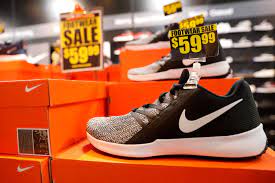
Check Out Our Additional Blog Posts Here:
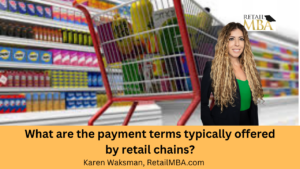
Retail Terms
Retail Terms – What are the payment terms typically offered by retail chains? Click Here to Learn More!
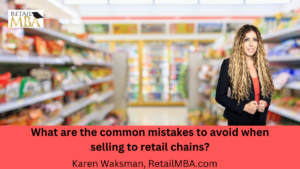
Retail Vendor
Retail Vendor – What are the common mistakes to avoid when selling to retail chains? Click Here to Learn More!
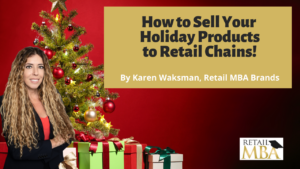
How to Sell Your Holiday Products to Retail Chains
New Training on How to Sell Your Holiday Products to Retail Chains

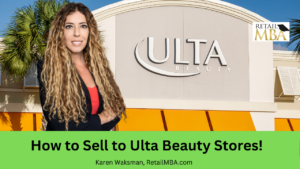
Ulta Beauty Vendor
Ulta Beauty Vendor – How to Sell to Ulta Beauty Stores. Click Here to Learn More!
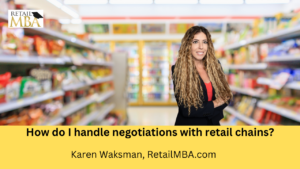
Retail Strategy
Retail Strategy – How do I handle negotiations with retail chains? Click Here to Learn More!

